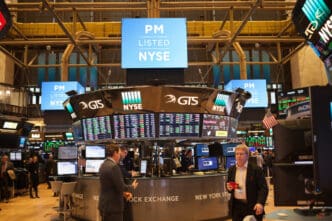On Monday, U.S. stocks and the dollar experienced significant declines as investors grappled with ongoing tariff uncertainties and President Donald Trump’s efforts to remove Federal Reserve Chair Jerome Powell. The Dow Jones Industrial Average dropped 750 points, or 1.9%, while the broader S&P 500 fell 2.1%. The tech-heavy Nasdaq Composite also slid, losing 2.65%. These declines followed a disappointing close the previous week, with stock futures already showing weakness in premarket trading.
The U.S. dollar index, which tracks the dollar’s performance against six major foreign currencies, fell 1.1% to reach its lowest level in more than three years. Market volatility has been heightened since President Trump criticized Powell on Thursday, expressing frustration on social media by stating, “His termination cannot come fast enough!” Trump’s ongoing dissatisfaction stems from Powell’s reluctance to cut interest rates further, a stance the President has criticized repeatedly.
This tension intensified after the European Central Bank lowered its interest rate, and Powell addressed the potential economic impacts of Trump’s tariff policies. “If I want him out, he’ll be out of there real fast, believe me,” Trump remarked to reporters from the Oval Office last Thursday, emphasizing his disapproval. On Monday, Trump continued his verbal attacks, labeling Powell a “major loser” in another social media post urging rate reductions from the Federal Reserve.
Kevin Hassett, Director of the National Economic Council, mentioned on Friday that the Trump administration is exploring the legal possibilities of dismissing Powell, a departure from his previous emphasis on the Fed’s independence. Legal experts largely agree that the President lacks the authority to fire the Fed Chair due to policy disagreements. Nevertheless, Trump has shown a willingness to challenge established norms, even with potentially significant consequences.
In Chicago last Wednesday, Powell noted that Trump’s tariffs are unprecedented and could lead to inflation and slow economic growth, complicating the Fed’s monetary policy decisions. Trump, who appointed Powell during his first term, has had a contentious relationship with him over interest rates. The Fed’s political independence is a cornerstone of its operation, and attempts to dismiss Powell are expected to negatively affect market stability.
Trump’s attacks have also sparked concerns about investor confidence in U.S. financial markets. “President Trump’s renewed criticism of Fed Chair Powell this week serves as a reminder that trade policy is not the only way the administration’s unconventional approach could undermine the dollar and U.S. asset markets,” commented Jonas Goltermann, senior markets economist at Capital Economics.
Typically, investors seek safe havens like U.S. government bonds and the dollar during stock market downturns. However, the dollar has weakened, with gold prices soaring, signaling a shift in investor sentiment. Krishna Guha, vice chairman at Evercore ISI, wrote on Friday that recent market behavior reflects diminishing confidence in Trump’s economic strategies, as evidenced by rising Treasury yields and a softer dollar.
Analysts at Macquarie suggested that the “flight from the USD” is driven by concerns over the Fed’s independence and a lack of progress in trade negotiations, which might extend for many months. On Monday, the yield on the 10-year Treasury rose to 4.365%, up from the previous Thursday. U.S. trading was closed on Friday due to Good Friday observances.
The Federal Reserve’s board of governors is scheduled to convene during the first week of May to decide on the benchmark interest rate. According to the CME FedWatch tool, approximately 88% of traders anticipate that the Fed will maintain current rates. “Powell reiterated that the Fed is likely to remain in wait-and-see mode as it assesses the economic impact of tariffs,” noted analysts at Morgan Stanley.
Gold surged more than 2% on Monday, reaching a new record high above $3,400 per troy ounce. The precious metal has gained over 27% this year, surpassing its growth through 2024, as investors flock to it as a safe haven.
This week, Wall Street will also focus on first-quarter earnings reports. Investors are expected to closely monitor executive insights and forecasts amid the ongoing tariff challenges. Tesla is set to announce its earnings after the market closes on Tuesday, while Alphabet is scheduled to report on Thursday. “Tariffs will remain a key concern in the coming months; however, investors are likely to shift their short-term focus to the Q1 2025 earnings reporting period,” stated Sam Stovall, chief investment strategist at CFRA Research.
This story is developing and will be updated as more information becomes available.








